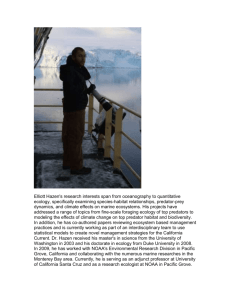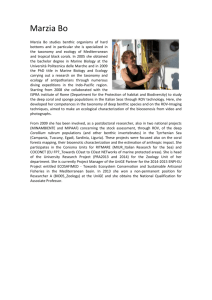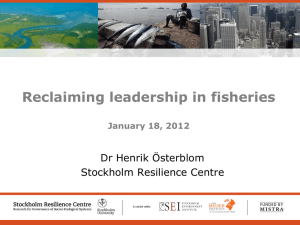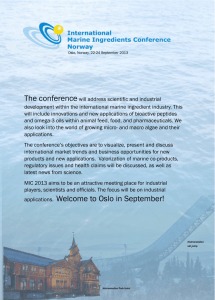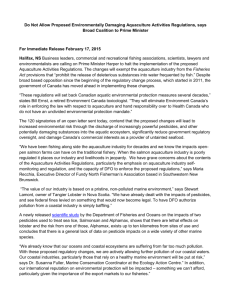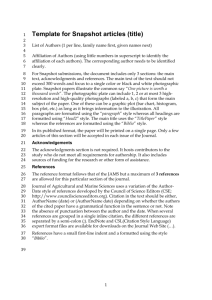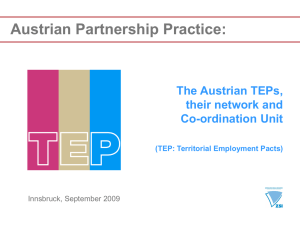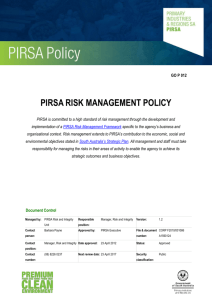About the role
advertisement
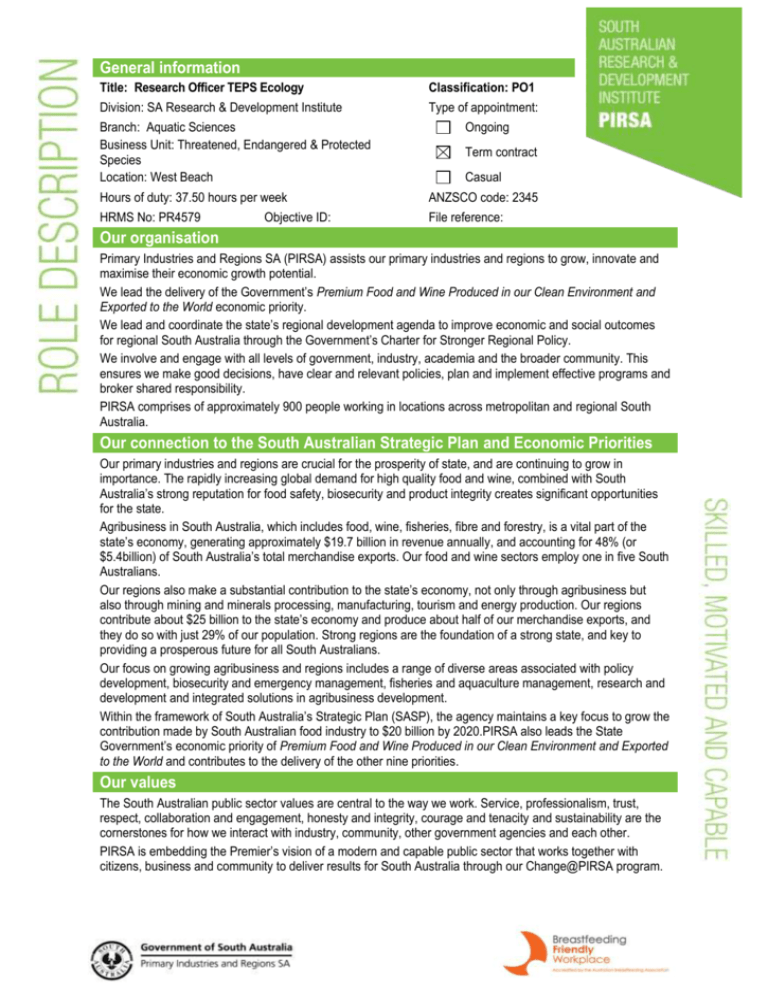
General information Title: Research Officer TEPS Ecology Classification: PO1 Division: SA Research & Development Institute Type of appointment: Branch: Aquatic Sciences Business Unit: Threatened, Endangered & Protected Species Location: West Beach Ongoing Term contract Casual Hours of duty: 37.50 hours per week ANZSCO code: 2345 HRMS No: PR4579 File reference: Objective ID: Our organisation Primary Industries and Regions SA (PIRSA) assists our primary industries and regions to grow, innovate and maximise their economic growth potential. We lead the delivery of the Government’s Premium Food and Wine Produced in our Clean Environment and Exported to the World economic priority. We lead and coordinate the state’s regional development agenda to improve economic and social outcomes for regional South Australia through the Government’s Charter for Stronger Regional Policy. We involve and engage with all levels of government, industry, academia and the broader community. This ensures we make good decisions, have clear and relevant policies, plan and implement effective programs and broker shared responsibility. PIRSA comprises of approximately 900 people working in locations across metropolitan and regional South Australia. Our connection to the South Australian Strategic Plan and Economic Priorities Our primary industries and regions are crucial for the prosperity of state, and are continuing to grow in importance. The rapidly increasing global demand for high quality food and wine, combined with South Australia’s strong reputation for food safety, biosecurity and product integrity creates significant opportunities for the state. Agribusiness in South Australia, which includes food, wine, fisheries, fibre and forestry, is a vital part of the state’s economy, generating approximately $19.7 billion in revenue annually, and accounting for 48% (or $5.4billion) of South Australia’s total merchandise exports. Our food and wine sectors employ one in five South Australians. Our regions also make a substantial contribution to the state’s economy, not only through agribusiness but also through mining and minerals processing, manufacturing, tourism and energy production. Our regions contribute about $25 billion to the state’s economy and produce about half of our merchandise exports, and they do so with just 29% of our population. Strong regions are the foundation of a strong state, and key to providing a prosperous future for all South Australians. Our focus on growing agribusiness and regions includes a range of diverse areas associated with policy development, biosecurity and emergency management, fisheries and aquaculture management, research and development and integrated solutions in agribusiness development. Within the framework of South Australia’s Strategic Plan (SASP), the agency maintains a key focus to grow the contribution made by South Australian food industry to $20 billion by 2020.PIRSA also leads the State Government’s economic priority of Premium Food and Wine Produced in our Clean Environment and Exported to the World and contributes to the delivery of the other nine priorities. Our values The South Australian public sector values are central to the way we work. Service, professionalism, trust, respect, collaboration and engagement, honesty and integrity, courage and tenacity and sustainability are the cornerstones for how we interact with industry, community, other government agencies and each other. PIRSA is embedding the Premier’s vision of a modern and capable public sector that works together with citizens, business and community to deliver results for South Australia through our Change@PIRSA program. Our expectations You accept responsibility for your own and others safety and will adopt appropriate hazard management practices consistent with the role, including contributing towards the completion of the Site Safety Management Plans. You uphold the ethical behaviour and professional integrity standards as contained in the Public Sector Act, 2009. You familiarise yourself with the Code of Ethics for the South Australian Public Sector and ensure that you follow it. You participate in PIRSA’s Performance Management and Development Program. You may be assigned alternative duties consistent with PIRSA’s business needs and/or the developmental needs arising from your performance review conversations. You contribute to whole-of-agency working groups developing PIRSA policy responses to significant and emerging issues as required. You undertake training and participation in emergency management activities as required. You implement and maintain security in line with whole-of-government and agency policies. You adhere to the PIRSA Smoke Free Policy. About the role The Research Officer – TEPS Ecology is part of SARDI – Aquatic Sciences within the South Australian Research and Development Institute. South Australian Research and Development Institute (SARDI) is a leading research and development institute delivering innovation to enhance the food, fibre and bioscience industries and living environmental systems, working in collaboration with state, national and international collaborators, partners and investors. SARDI transfers its knowledge, technologies, products and services through scientific exchange, extension and commercial arrangements with the principal aim of enhancing the State’s economic development. SARDI currently employs approximately 440 staff in five Strategic Research Areas (Aquatic Sciences, Crops, Horticulture, Livestock Systems, and Sustainable Systems) and a Business Services unit, located at 15 key locations around metropolitan Adelaide, inner country and rural locations. SARDI Aquatic Sciences is a research provider to the fishing, aquaculture and environment industries. The application of the research outcomes helps to ensure that the research base remains healthy and the information provides a basis for sound management decisions. Staff are located at the South Australian Aquatic Sciences Centre – West Beach, Pt Lincoln and Mt Gambier. The Marine Ecosystems Program undertakes a wide range of research activities, including habitat mapping; environmental impact assessment; effects of trawling; seagrass ecology, ecophysiology and rehabilitation; reef health assessments; the ecology and management of human impacts on threatened, endangered and protected (TEP) marine species, including marine mammals, seabirds and sharks; performance assessment of marine parks; ecological modelling; and marine pests. The program provides advice to State and Commonwealth governments on the management of a range of marine environmental issues, particularly marine pests and Threatened, Endangered & Protected Species (TEPS), and conducts commercial EIS work for a variety of clients. The current sub-programs are Environmental Assessment, Mitigation, and Rehabilitation, Aquaculture Environment; Marine Pests, TEPS, and Oceanography. The TEPS Sub-Program delivers high quality research on the population ecology of threatened endangered, protected and iconic marine species, their trophic and operational interactions with fisheries and aquaculture to support Government conservation and management objectives, including ecological sustainable development. The TEPS Sub-Program has key capabilities in the ecology, habitat-use and foraging dynamics of marine mammals, seabirds, migratory and iconic sharks and teleosts, ecosystem trophodynamics, ecosystem-based fisheries management, the ecological impacts of fishing, protected species interactions with fisheries, and protected species conservation and management. The Research Officer – TEPS Ecology will provide assistance in undertaking and managing research projects within the Sub-Program. The Research Officer is responsible for coordinating the fieldwork and assisting with the analysis, report and manuscript preparation for projects principally funded as part of the Great Australian Bight Research Program, the Fisheries Research and Development Corporation (FRDC), the Department of the Environment, the SA Department of Environment, Water and Natural Resources and the Integrated Marine Observing System (IMOS). These projects have some overlap, but broadly they aim to monitor population status and trends in abundance of key pinniped, cetacean and seabird populations; assess the foraging Page 2 of 5 ecology of these species and undertake research to understand the nature of TEPS interactions with fisheries and aquaculture, and where required develop and assess mitigation options. The principal role of the Research Officer will be to: i) undertake dietary analyses of faecal samples from seals as part of an FRDC Project ‘Assessment of the impacts of seal populations on the seafood industry in South Australia’; ii) analyse data on seabird abundance as part of the Great Australian Bight Research Program, and ii) to provide assistance in monitoring seals populations on Kangaroo Island as part of a DEWNR project ‘Monitoring of pinniped populations on Kangaroo Island: 2015-2018.’ The Research Officer will be expected to provide support to the Sub-Program Leader and other staff in these projects including field work, data analyses and assisting in the completion of client reports and scientific papers. Other requirements specific to the role includes: Some intra-state and interstate travel, including overnight absences and periods of time spent in isolated field locations, will be required. Periods of time undertaking field work will be spent on offshore islands and other remote areas. Appropriate field and research experience with marine mammals and seabirds are essential. Some intra-state and occasional interstate travel, including absence overnight, will be required. A current “car” driver’s licence is essential. Essential qualifications A degree in Science with a major in marine biology, fisheries or related discipline, and experience in the ecology of marine mammals and seabirds. Key results RESEARCH Under the direction of the Principal Scientist (Threatened, Endangered and Protected Species), scientific support is provided to a range of projects being conducted within the TEPS Subprogram. Broadly these include monitoring the population status and trends in abundance of key pinniped, cetacean and seabird populations; assessing the foraging ecology of these species and undertaking research to understand the nature of TEPS interactions with fisheries and aquaculture. Field data collection and laboratory analyses are carried out for the projects: pinniped, cetacean and seabird abundance, population and foraging ecology, fishery and aquaculture interactions. Data entry, database management and data analyses are conducted for the above mentioned projects. Outcomes of research are observed and possibilities for further experimentation discussed with the project leader(s). Industry issues and research priorities are understood. Scientific parameters within the projects are defined and standard procedures and methods are applied to the projects under supervision, including collection of data (field and laboratory processing) and statistical analysis. Report and manuscript preparation is assisted for the above mentioned projects. Contribution is made as co-author of scientific papers and presentation of research conclusions. Technical assistance is provided to the TEPS subprogram as directed by the Principal Scientist (TEPS SubProgram Leader). Outcomes of research are observed and possibilities for further experimentation discussed with project manager. Industry issues and research priorities are understood. Scientific parameters within a project are defined and costed and human resources managed. Standard procedures and methods are applied to a straight forward project under supervision, including collection of data and standard analysis Reports with appropriate recommendations on straight forward projects are prepared. Contribution is made as co-author of scientific papers and presentation of research conclusions. FINANCE AND RESOURCE MANAGEMENT The TEPS research subprogram is conducted as agreed with the Principal Scientist and is managed to achieve key results within budget The conduct of projects and outcomes is reported to a program manager. The linkage between projects, programs and strategic directions is understood. The financial and budget planning process is understood. Assessment is made of future resource requirements for existing or new projects. Principles of managing a project budget are understood. Contribution is made to project budget monitoring. Asset and infrastructure principles are understood. Contribution is made to asset maintenance and planning. Recruitment and selection processes are understood, Position Descriptions are prepared and suitable new technical, operational and casual staff are appointed Technical, operational and casual staff are formally inducted and supervised for day-to-day work. INTELLECTUAL PROPERTY, TECHNOLOGY TRANSFER AND COMMERCIALISATION Commercial and other opportunities are understood and discussed in consultation with the project leader. Commercial and other opportunities are understood and discussed in consultation with the project leader. Laboratory procedures are implemented and lab book used under direction of the project manager. SARDI, government and funding agency policies are understood. Planning issues for commercialisation are understood. The procedure for commercialisation contract negotiation is understood. Key relationships Reports to the Principal Scientist and Subprogram Leader (TEPS). The incumbent works closely with other staff within the TEPS Sub-program, and with associated industries, other government departments, and other research organisations. Capabilities profile Capability (maximum of 8) Professional & Technical Knowledge Demonstrates a fundamental knowledge of marine threatened, endangered and protected species ecology; keeps up to date with relevant changes in methods for conducting ecological research. Behaviours (maximum of 3; Professional & Technical Knowledge unlimited) Demonstrates a thorough knowledge of the biology and ecology of pinnipeds, cetaceans and other TEPS. Demonstrates a capacity to analyse ecological datasets, and prepare reports and manuscripts for publication to a high standard. Demonstrated technical understanding of and experience in population ecology of marine TEPS and the survey and monitoring of their populations Demonstrated ability in statistical analysis Demonstrated ability in using a full range of PC applications, including [Access, Excel, Word, Powerpoint]. Maintains up to date knowledge and skills in the area of marine TEPS ecology, and relevant management issues in the region. Experience in the capture and handling of seals and seabirds, field fieldwork on offshore islands and at sea for the purpose of surveying populations and assisting in ecological research. Ability to successfully source, collate and synthesise data. Provides expert professional/technical advice to support decision making. Understands the general issues facing the 'industry'. Knows of industry changes, significant developments and affiliations within the industry, and builds industry contacts. Demonstrated ability and experience in undertaking fieldwork at times in remote areas and in small boats. Achievement Orientation Sets and achieves individual goals; manages workload and plans ahead to meet deadline, accomplishing the results desired. Planning and Organising (Work Management) Sets own work priorities, and use tools and time efficiently to meet work objectives. Written Communication Writes with clarity and conciseness. Investigative Skills Researches information from formal and informal sources that are provided and those that are self-identified. Team Work/Team Building Works easily with others to achieve shared outcomes; recognises issues that impact on others; seeks out, and is open to, input from other key players before making decisions. Flexibility Adapts to changes in environment and in work demands, working effectively with a variety of situations and people. Approvals Manager Chief Executive/Delegate Name ........................................................................ Name ............................................................................... Signature ........................................ Signature ............................................... ___/___/___ ___/___/___ Occupant I have read and understood the key results and expectations of this role. Name ............................................................................... Signature ............................................... ___/___/___
